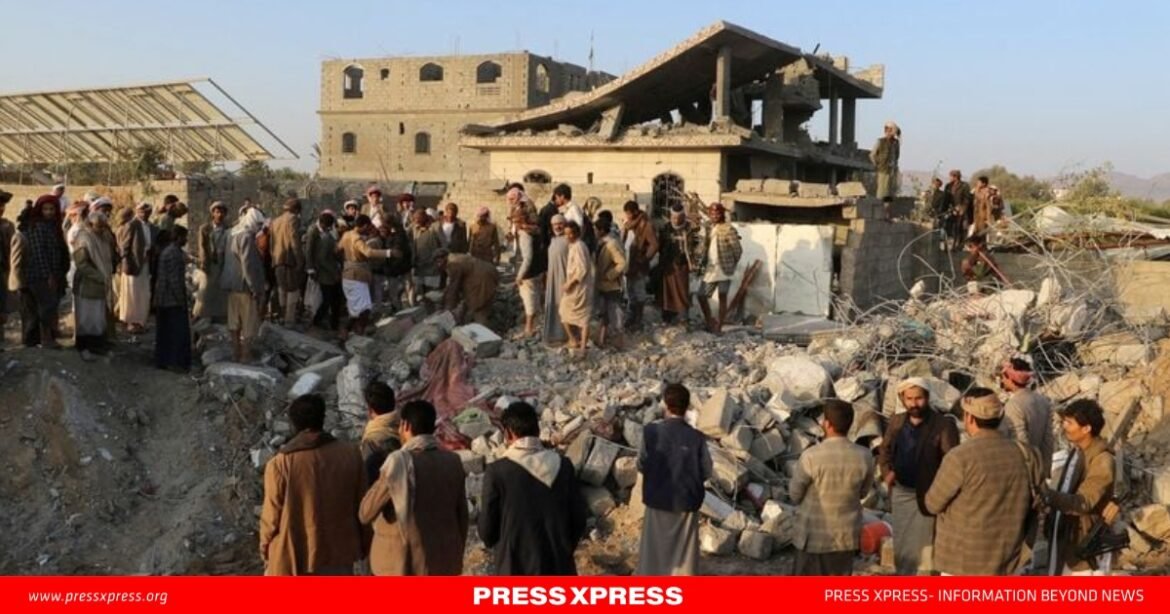At least 31 people, including children, were killed in a wave of US airstrikes across Yemen after former President Donald Trump warned the Houthi movement against attacking ships in the Red Sea. The strikes, which mark the most significant US military action since Trump returned to office in January, were in response to Houthi threats to target vessels linked to Israel over its blockade on Gaza.
The attacks began late Saturday and continued into the early hours of Sunday, hitting the capital, Sanaa, as well as the provinces of Saada, al-Bayda, and Radaa. According to Yemen’s Ministry of Health spokesperson Anis al-Asbahi, at least 101 people were injured—most of them women and children. Reports indicate that US forces also targeted areas in Hajjah, Marib, Dhamar, and Taiz.
Houthi Response: ‘This Will Not Go Unanswered’
The Houthis, who control much of northern Yemen, condemned the strikes as “US-British aggression” and vowed retaliation. “This attack will not go unanswered,” the group said in a statement, accusing Washington of escalating the conflict.
Trump, in a social media post, warned Iran to halt its support for the Houthis, stating, “Your time is up, and your attacks must stop, starting today. If they don’t, hell will rain down upon you like nothing you have ever seen before.” He ordered the US military to launch “a decisive and powerful operation” against the Houthis and promised to use “overwhelming lethal force” to achieve US objectives in the region.
Iranian Foreign Minister Abbas Araghchi condemned the attacks, calling them “illegitimate” and asserting that Washington has “no authority” to dictate foreign policy in the region.
Houthis Dispute US Claims
Despite their threats last week, the Houthis have yet to carry out attacks on Red Sea shipping since the ceasefire in Gaza. Houthi spokesperson Mohammed Abdul-Salam accused the US of exaggerating the threat to international navigation to justify its military action.
“The maritime embargo declared by Yemen in support of Gaza is limited to Israeli navigation until humanitarian aid is delivered,” he said.
In Sanaa, residents reported powerful explosions that shook neighborhoods. “It was like an earthquake,” said Abdallah al-Alffi, who lives in the eastern Geraf district.
Escalation in the Red Sea
The Houthis have launched more than 100 attacks on commercial and military vessels since November 2023, claiming solidarity with Palestinians in Gaza. Their attacks have disrupted global trade, forcing many shipping companies to reroute vessels around Africa, increasing costs and delays.
However, the Houthis temporarily halted their strikes in January when a ceasefire was declared in Gaza.
Analysts Question US Strategy
Al Jazeera’s Washington correspondent Patty Culhane noted that Trump’s justification for the strikes—stopping Houthi attacks—was questionable, as the group had not carried out any recent raids.
Former US diplomat Nabeel Khoury criticized the decision to launch strikes, arguing that military force alone would not eliminate the Houthis. “If Hamas, surrounded on all sides in Gaza, could withstand 17 months of bombardment, the Houthis—who operate in mountainous terrain—will be even harder to dislodge,” he said.
The US Central Command (CENTCOM) released images of the strikes, stating that they were intended to “defend American interests, deter enemies, and restore freedom of navigation.”
With tensions escalating, the Houthis have vowed to retaliate, raising fears of a wider regional conflict.


